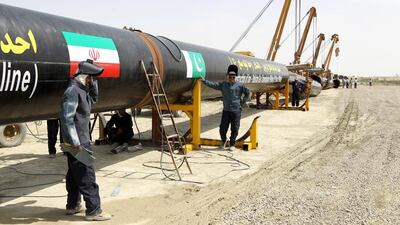Pakistan has sought US$2 billion financial assistance from Iran to pay for the cost of building its section of $7.5bn Iran-Pakistan (IP) gas pipeline project, which faces stiff opposition from the United States because of Tehran’s nuclear ambitions.
The Pakistani government has run into repeated problems paying for the 780-kilometre section to be built on its side of the border.
Iran has already completed a 900km stretch of the 1,680km pipeline on its side.
Now, however, the authorities in Islamabad have switched from slumber to expedition on the IP pipeline, a project regarded as an energy lifeline for Pakistan.
Islamabad has asked Tehran to finance the construction of the Pakistani side of the gas pipeline because the international sanctions against Iran also prevent Pakistan from raising funds for the project.
The finance minister Ishaq Dar made the request to his Iranian counterpart Ali Tayyebnia during a meeting on the sidelines of the annual World Bank and IMF meetings in Washington this month.
However, the Iranian deputy oil minister, Ali Majedi, said this week that it “did not make such a commitment to help Pakistan with $2bn for the construction of the pipeline” and that each side “must bring its own share” in financing the project, adding the “Pakistanis need Iran’s gas and they should accelerate their work”, Dow Jones reported.
Last year, Tehran had pledged a $500 million loan to Pakistan for laying the pipeline, currently estimated to cost $2bn. Under a contractual obligation, the country has to complete the project by the end of next year or will have to pay a penalty of $3m a day to Iran if it fails to complete the project within the stipulated time frame.
However, following through possibly the entire financing of the Pakistani section of pipeline will be difficult for sanctions-hit Iran.
That is why, Islamabad is also looking to Russia, which has shown interest to build and finance the strategic IP pipeline under the deal based on government-to-government cooperation. Washington threats to impose sanctions are considered unlikely to concern Moscow too much.
Last year, Russia offered to finance the pipeline project if its energy giant Gazprom was awarded the contract without a bidding process. But Islamabad will have to waive its Public Procurement Regulatory Authority rules to do so. The two countries are expected to discuss the issue of Gazprom participation in the project in a scheduled meeting of the Pakistan-Russia joint working group next month.
Pakistan, meanwhile, is suffering from a power crisis because of a shortage of gas in the energy sector. Its own proven gas reserves are rapidly dwindling. Under the IP pipeline deal, Iran will initially transfer 30 million cubic metres of gas a day to Pakistan, but will eventually increase the transfer to 60 million cubic metres a day.
Iran currently produces about 600 million cubic metres of gas a day, almost all of which is consumed domestically, AFP reported. Its only foreign client is Turkey, which buys about 30 million cubic metres a day, AFP said.
The Asian Development Bank (ADB) has projected that Pakistan’s domestic production of natural gas will decline from the current 38.4 billion cubic metres to 13 billion in 2035 and the country will have to start importing natural gas sometime after 2015.
In its Energy Outlook for Asia and Pacific report, the ADB has warned that securing foreign energy supplies will be critical for Pakistan to achieve even a relatively low economic growth rate of 3.4 per cent over the next two decades.
The government has so far only increased electricity tariffs to address the power sector’s problems. Under its energy policy, Islamabad also plans to import high price natural gas or LNG to run the power plants, which rely on costly imported fuel oil.
Currently, the country under its “energy emergency” strategy needs to materialise at least one gas import project through a pipeline either from Iran or Turkmenistan.
The Turkmenistan-Afghanistan-Pakistan-India gas pipeline, aimed at importing 90 million cubic metres of gas, is a project fraught with uncertainty because of the volatile security situation in war-torn Afghanistan.
The only gas import option left for Pakistan is the IP pipeline that can address the country’s crippling energy demands.
The threat of US sanctions has frightened off most international investors. Under US laws, automatic sanctions will be imposed on those states and financial organisations that make investments in Iranian oil and gas projects.
Last year the Industrial and Commercial Bank of China refused to sign a contract for financial advisory services to raise funds for the IP pipeline.
In 2009, India withdrew from the project, which was originally planned to extend from Pakistan to India.
Syed Fazl-e-Haider is a development analyst in Pakistan. He is the author of many books, including The Economic Development of Balochistan

